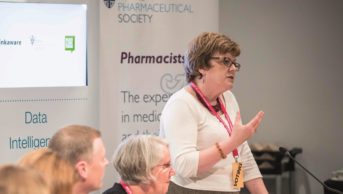
Royal Pharmaceutical Society
How clinical pharmacists can add value in the specialist care of patients is among the themes to be explored at this year’s RPS Annual Conference.
The “Leading clinical practice” stream is not about trying to teach all the knowledge that is required to become an advanced pharmacist in a specialist field. (It is unlikely that the audience would appreciate a full session on pharmacokinetics in premature babies or neuronal changes that can occur in specific mental health conditions, for instance.) However, participants of this conference stream will explore why patients cannot all be dealt with the same way.
We believe the session will also offer insight into why all the pharmacology, pharmaceutics and law that pharmacists learn at university are really necessary to adapt our minds to being effective clinical pharmacists.
Attendees will hear about the reasons that medicines adherence varies so much within and between different specialist groups and what pharmacists can do to support patients with their medicines. There will be some ethical dilemmas of evidence-based medicine to consider, as well as governance issues around the use of unlicensed medicines.
The question of when to crush a medicine and when to order a special should create some lively debate and we expect to touch on covert administration, too.
This session should be relevant to pharmacists from all sectors. It will touch on many aspects of medicines use from clinical trials and manufacturing through to purchase, dispensing and administration. There is a patient at the end of all medicine processes and, in that sense, we are all clinical pharmacists.
Another of the clinical sessions will focus on the global concerns about antimicrobial resistance (AMR). In April 2014 the World Health Organization reinforced the fact that “without urgent, co-ordinated action by many stakeholders, the world is headed for a post-antibiotic era, in which common infections and minor injures which have been treatable for decades can once again kill”.
We will consider the government’s national strategy on AMR and look at ways that members of the profession can help implement antimicrobial stewardship activities locally.
With the rise in the number of infections caused by antibiotic-resistant bacteria and a lack of new antibiotics being developed, AMR is a major clinical and public health issue that needs to be tackled.
Pharmacists in different areas of the profession can show leadership, for example, by advising on national guidance, optimising prescribed therapies, driving quality improvements, educating patients and establishing research partnerships. We look forward to discussing these crucial elements at the RPS Annual Conference.
Stephen Tomlin
is consultant paediatric pharmacist at Guy’s & St Thomas’ NHS Foundation Trust and
Mark Gilchrist
is consultant pharmacist for infection at Imperial College Healthcare NHS Trust. The
RPS Annual Conference
is being held in Birmingham on 7–8 September 2014.
You may also be interested in

Opportunities to learn and network

Educating for excellence
